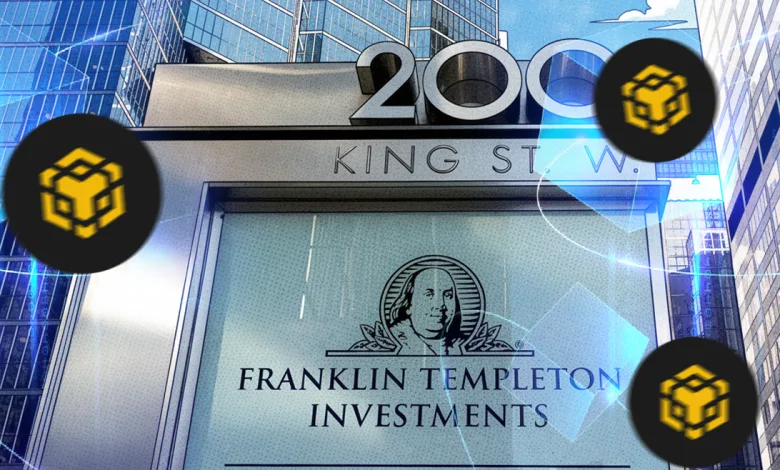Franklin Templeton Expands Benji Platform to BNB Chain

- Franklin Templeton expands Benji tokenization platform to BNB Chain for scalability.
- BNB Chain integration highlights demand for low-cost, compliant RWA infrastructure.
- Global RWA market tops $30B, with institutional players driving adoption at scale.
Franklin Templeton has expanded its Benji tokenization platform to BNB Chain, signaling a deeper move by traditional finance into public blockchains. The U.S. investment giant, which manages $1.6 trillion in assets, first launched Benji in 2021. That launch marked the world’s first U.S.-registered mutual fund issued directly on-chain. By expanding beyond Ethereum, Franklin Templeton aims to scale tokenized real-world asset products on public infrastructure.
Franklin Templeton Scales Benji with BNB Chain
The Benji Technology Platform allows investors to access tokenized funds, including mutual funds, money markets, and equities. It processes transactions and maintains share ownership records using blockchain technology. Franklin’s OnChain U.S. Government Money Fund remains one of its flagship products under the platform.
The move to BNB Chain underlines the need to have a scalable and cost-effective infrastructure. BNB Chain has a sub-second transaction finality, high throughput, and ultra-low charges. These characteristics contribute to the practicability of global tokenization of real-world assets.
According to Franklin Templeton’s head of digital assets, Roger Bayston, the goal is a broader investor reach. He emphasized that security and compliance remain central as the firm expands tokenization globally. The company said it will use BNB Chain’s infrastructure to deliver tokenized products with greater utility and enhanced features.
Sarah Song, the head of business development of the BNB Chain, said that the chain offers a setting adapted to tokenized assets. She highlighted fast settlement, low costs, and compliance-ready tools as advantages. Franklin Templeton’s integration validates BNB Chain as a key network for regulated financial products.
Real-World Assets Expand in a Growing Market
The global real-world asset (RWA) sector has expanded rapidly. Data from RWA.xyz shows that the on-chain RWA market recently surpassed $30 billion. That figure is almost double what was recorded in January 2025. More than 400,000 individual holders now own RWAs globally.
Despite the growing number of holders, trading activity has slowed. RWA transfers reached $63.18 billion in the past 30 days. That was more than 20% lower than the prior month. Analysts note this reflects more long-term holders while overall transaction activity levels off.
Franklin Templeton’s Benji platform already operates across several blockchains, including Ethereum, Stellar, Solana, and Arbitrum. Stellar hosts the largest portion of Benji’s assets, where it holds more than $467 million of the total amount of $731.8 million. Industry leader BlackRock’s BUIDL fund remains the largest tokenized U.S. Treasury product, with $2.1 billion in on-chain value.
BNB Chain is among the leading blockchains of tokenized assets in the world. The network supports over $542 million in RWAs. It has also grown into the fifth-largest blockchain by market capitalization, valued at $140.65 billion.
BNB, the native token of the chain, recently surged past $1,000 for the first time. The asset traded at $995.11 at press time, showing a 17% monthly growth. However, BNB dropped nearly 2% within the past 24 hours, indicating short-term volatility amid broader gains.
Related: Blockchain Will Lead the Future: Franklin Templeton CEO
The partnership between Franklin Templeton and BNB Chain strengthens the link between legacy finance and decentralized finance. By using public blockchains, institutions can scale regulated financial products globally. The collaboration also opens multi-chain access for retail and institutional investors alike.
For Franklin Templeton, the next stage of Benji involves deepening access across networks like BNB Chain. BNB Chain indicated that it would proceed with Franklin Templeton to increase tokenized services. The roadmap involves the exploration of cross-chain liquidity, compliant products, and user-friendly solutions for broader adoption.




